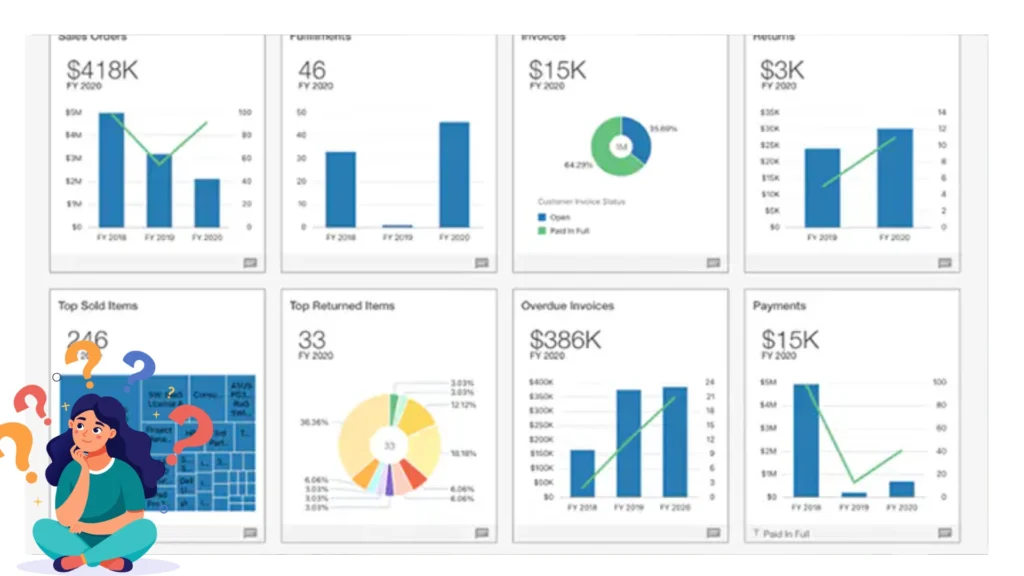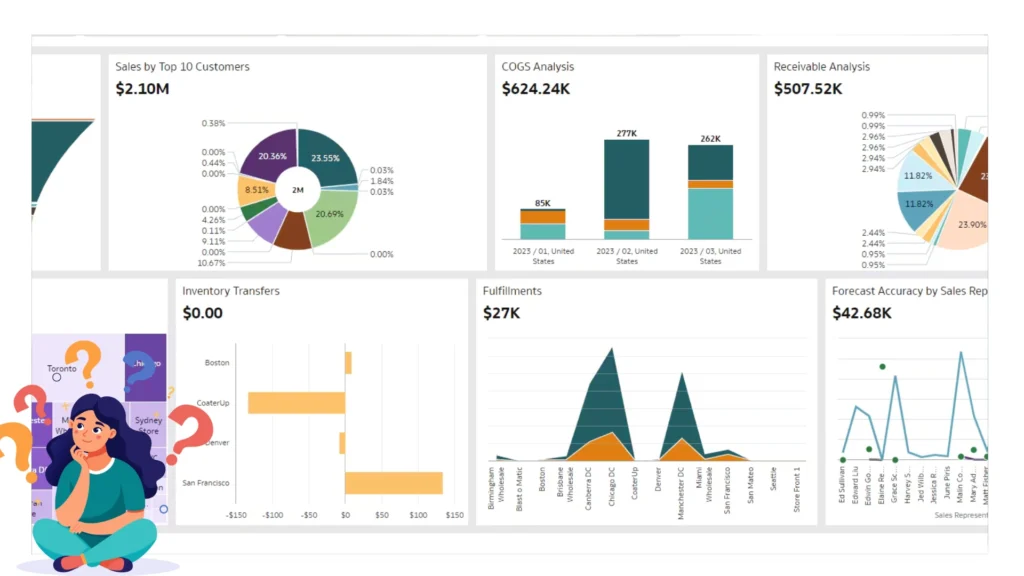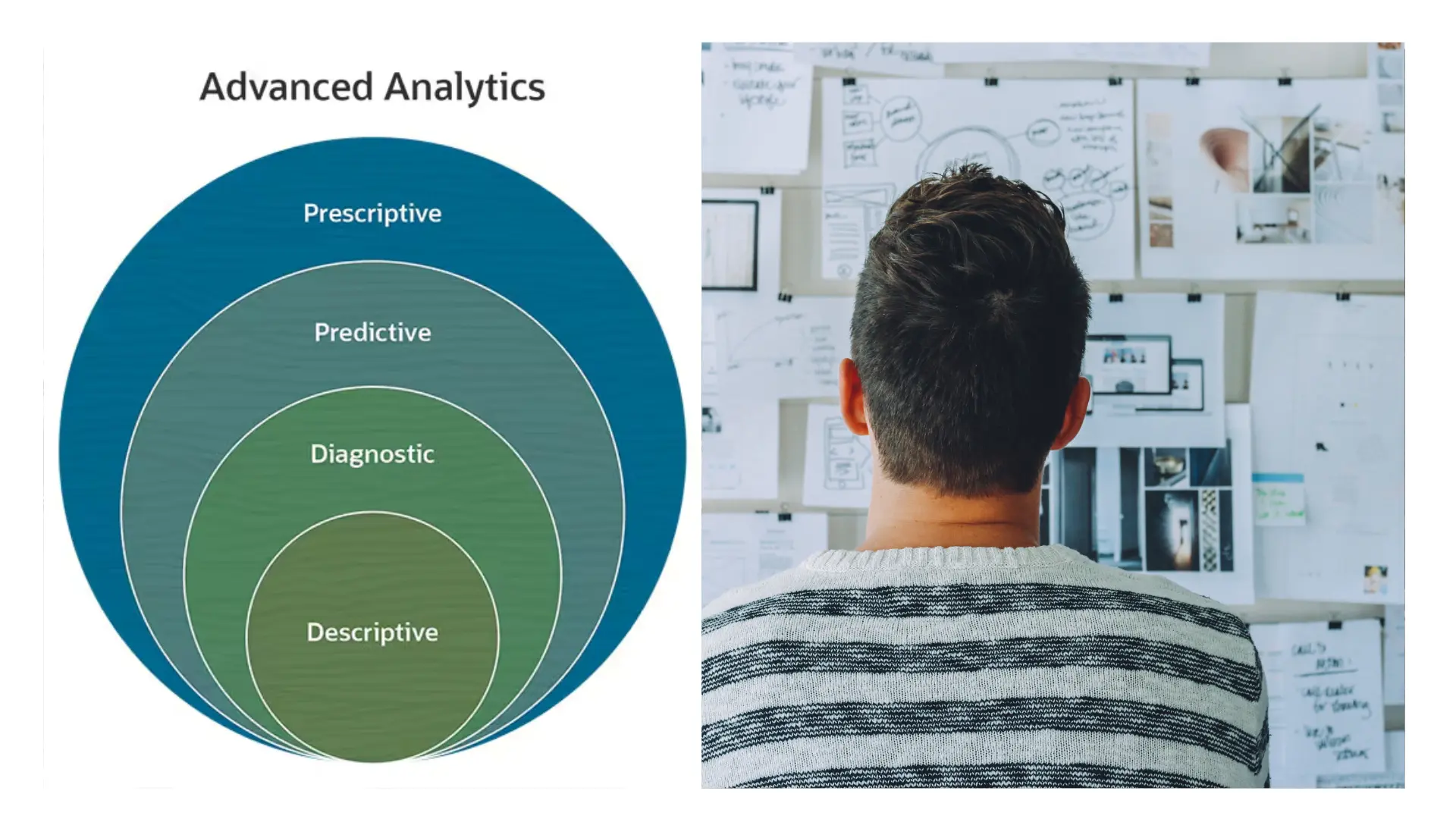With this rapidly changing business environment, organizations are always trying to enhance their planning processes. Predictive analytics is one of the significant instruments used for achieving better planning and decision-making. The top cloud ERP solution, NetSuite, has integrated predictive analytics into its platform, where businesses may utilize the opportunity to make forecasts about future trends, optimize their operations, and hence make data-based decisions. The acquisition of such technology helps businesses enhance their planning processes with reduced risk and efficiency.
Table of Contents
ToggleWhat is Predictive Analytics?
Predictive analytics is the utilization of historical data, statistical algorithms, and machine learning techniques for the anticipation of future outcomes. In business, it empowers organizations to anticipate future demands, trends, and challenges that might pop up ahead, which in turn encourages the organization to be proactive and respond appropriately with their decisions. This could be applied to any parameter in business planning, including sales forecasting, inventory management, understanding the pattern of customers, financial planning, and so on.

Why Predictive Analytics is Important for Planning
Planned activities are very significant in business, whether big or small. The problem is that most kinds of traditional planning have static models and a touch of subjective judgment, which easily leads to errors. Predictive analytics, on the other hand, offers businesses a more dynamic, data-driven approach from mere reactive planning to proactive decision making and consequently to more accurate forecasting, better resource utilization, and the option to innovate concerning changes in the market.
For instance, using predictive analytics is able to forecast product demand, recognize patterns of consumer behavior, and optimize the level of inventory that would result in minimal stockouts and excess inventory. Applying predictive models in financial planning enables organizations to identify income trends, which can help them set more accurate budgets and forecasts. This level of insight is also especially valuable for companies working in retail, manufacturing, and logistics environments, since fluctuations in demand can drastically affect the way business operations are carried out.
Application of NetSuite in Predictive Analytics
NetSuite is an integrated platform of all aspects of business management, which include finance, supply chain, and CRM. Predictive analytics within the platform of NetSuite further enhances the capabilities of the platform, giving businesses a competitive edge in their planning processes.
Some ways through which predictive analytics in NetSuite may enhance business planning are as follows:
- Sales Forecasting and Demand Planning
Getting sales and demand right is one of the most important matters of business planning. Basically, NetSuite predictive analytics rely on historical sales data and market trends to establish highly accurate sales forecast. That means businesses could prepare their inventory levels, change marketing strategies, or ensure that production and procurement are aligned with demand. Businesses would avoid stockouts or overstocking, optimize supply chains, and lower costs in addition to improving customer satisfaction.
- Financial Planning and Budgeting
Predictive analytics in NetSuite can change everything a business might know about financial planning. With historical financial data and trending economics, NetSuite can inform an organization of future cash flow, revenue, and expense expectations. Budgets can be developed much more accurately, and managers can identify financial risks that could impact the organization. More importantly, predictive models make it possible to allow businesses to test different scenarios, thus making it possible for top executives to be more knowledgeable when making decisions about investments, cost-saving strategies, and capital allocation.
- Inventory Management
For all businesses which entail big inventory, effective management of stocks is a prerequisite. Predictive analytics helps businesses predict demand levels in terms of different products, and hence the need for adjustments in the inventory levels. Based on historical data of sales and supply chain, NetSuite predicts the items likely to be in high demand and the slow-moving items. This now optimizes the stock levels so as to cut carrying costs and deliver the correct product at the right time to the customer. This therefore helps businesses to avoid costly stockouts and excess inventory while improving overall customer satisfaction.
- Customer Relationship Management (CRM)
Predictive analytics capability also extends towards CRM to enable companies to gain better customer retention as well as acquisition. By making use of the purchase behavior from customers and demographic data among other pertinent variables, a business can determine its high-value customers that should be targeted marketing campaigns at specific customer segments. Predictive models can also predict customers who may churn, and therefore, take a proactive step ahead in retaining at-risk customers by offering personalized promotions or improving customer service.
- Supply Chain Optimization
Managing a supply chain is a very intricate process because it consists of multiple moving parts, starting from procurement to production and then delivery. Predictive analytics in NetSuite helps organizations optimize their supply chains, as demand can be forecasted and potential bottlenecks or inefficiencies in supply chains can be found. By providing lead time, demand fluctuation, and supplier performance predictions, businesses can enhance their source decisions, decrease lead times, and hence smoothly run the operations.

Benefits in Planning with Predictive Analytics
When predictive analytics is integrated into planning modules in NetSuite, organizations benefit in quite a number of ways. Some of them include:
- Accuracy is Enhanced: In the wake of data-driven models and algorithms, it is possible to make relatively correct forecasts concerning sales, inventory levels, financial performance, and customer behavior.
- Foreseeing Future Trends and Outcomes: By forging ahead and acting proactively about future trends and outcomes, organizations can act in anticipation and strive to neutralize risks, capture opportunities, and optimize resources.
- Operational Efficiency: Predictive analytics helps streamline the operations of firms, eliminating inefficiencies, reducing waste, and improving resource allocation.
- Cost Savings: With demand forecasting, proper inventory management helps reduce the quantity of stockouts, excess inventory, and unnecessary procurement costs.
- Scalability: Predictive analytics offers a scalable solution for growing businesses that can handle an increase in data and complexity to continually improve planning processes.
Key Challenges and Considerations
While predictive analytics has many obvious advantages, some challenges need to be taken into consideration by an organization before they implement it within NetSuite. Those are as follows:
- Data Quality: Predictive analytics depends on clean, high-quality data. Organizations must ensure that their data is clean, consistent, and up to date to achieve reliable results.
- Integration: Its integration with existing systems is as complex as integrating any other software solution when businesses utilize multiple solutions. NetSuite also offers built-in capabilities to integrate with other systems, but it is important that they get the data flow from the different platforms to work well together.
- Expertise and Skills: Building and interpreting predictive models requires expertise in data science and analytics. Organizations will need to invest in more training or hire specialists to use these tools effectively.
Conclusion
Predictive analytics is revolutionizing the way planning and decision-making occur within a business. Using integrated predictive analytics for NetSuite, organizations would attain valuable insights into future trends, accuracy in sales forecasting, optimized management of their inventory, and data-driven financial decisions. The more companies incorporate this technology into their business model, the more anticipating and responding to changes in the market would be the key differentiator for those companies to maintain their position in the market while long-term success remains elusive proof beyond.



